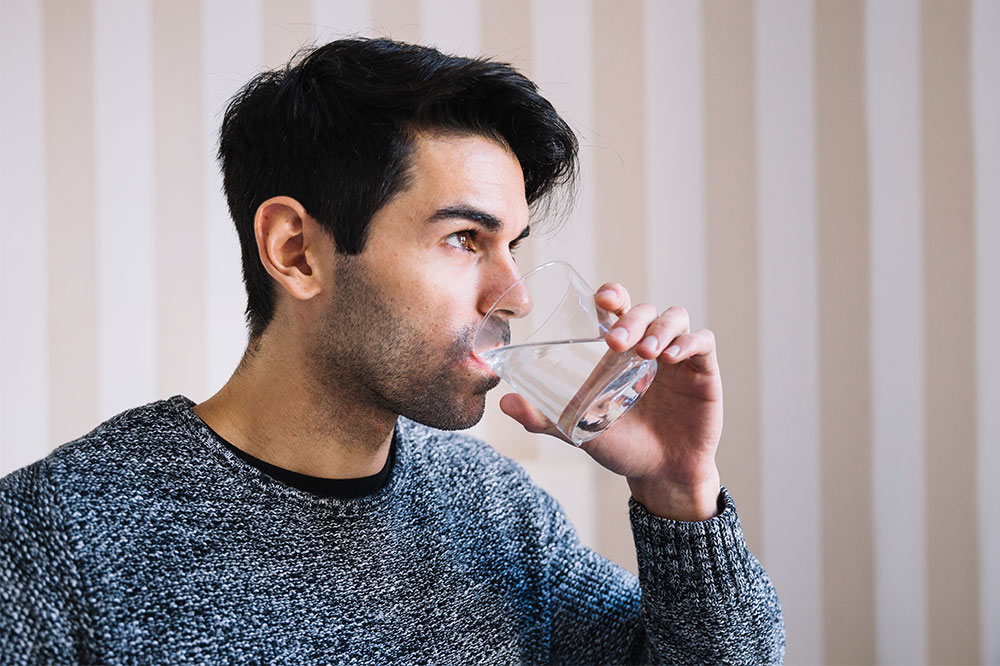11 common side effects of drinking insufficient water

Nearly 80 percent of the body is made of water. Every tissue, cell, and organ requires water for optimal functioning. Moreover, all bodily processes, from digestion to blood circulation, need water. Water is essential to flush out toxins from the body, carry oxygen to every organ, carry essential nutrients to all body parts, and maintain skin and hair health. Needless to say, there can be several side effects from not drinking enough water.
- Constant headaches
One of the most common side effects of not drinking enough water is experiencing persistent headaches. This is because insufficient water causes an imbalance of electrolytes and fluids in the body. The fluid loss causes the tissues in the brain to shrink or contract. As the brain shrinks, it starts to pull away from the skull, putting pressure on the nerves. This is what causes the constant headaches. - Constipation
When sufficient water is in the body, the colon takes it from the bloodstream to the intestines. This is done to soften and bulk up the stools. However, when you don’t drink sufficient water, there is not enough for the digestion process to complete. As a result, the stool becomes hard, and there are motility issues since the hardened stool cannot pass through the system. So you experience constipation. - Unhealthy skin
Water provides hydration to your skin cells and plumps them up. This is what gives your skin its natural glow and brightness. Drinking enough water also makes the skin look vibrant. The water helps flush out the toxins. But insufficient water will make the skin lose elasticity and plumpness. This is another obvious side effect of not drinking enough water. The skin becomes dry and flaky. Also, there is inflammation, and the skin is prone to infections and other problems. - Constant fatigue and weakness
A significant side effect of not drinking enough water is feeling tired and weak. Insufficient intake of water causes a loss of fluids in the body. This leads to a lowering of the blood pressure. As a result, the heart does not pump enough oxygen to reach all the organs, including the brain. Also, the low pressure prevents enough nutrients from moving through the body. Due to this, you can experience sluggishness that causes periods of fatigue and low energy. - Dry mouth
The lack of water in your system can cause the salivary glands to produce less saliva. This saliva becomes the mucus that keeps the mucous membranes in your mouth properly hydrated and moist. Since there is not enough saliva, the membranes become dry. As a result, your mouth will feel dry. This can also make it difficult to swallow, breathe, or talk. - Bad breath
Due to the lack of saliva caused by insufficient water intake, bacteria build up on the teeth, gums, and tongue. This contributes to bad breath. With the consumption of enough water, the saliva produced would have killed off the germs. However, the lack of enough water in the body causes germs to build up in the mouth. So despite good oral hygiene practices, you may have bad breath. - Cravings for sugary foods
Sugar cravings are another side effect of not drinking enough water. This happens because the body’s ability to retrieve energy from the glucose in the bloodstream diminishes. This triggers cravings for foods rich in carbohydrates and sugar. So if you have sudden and unusual cravings for sugary snacks and food, it can be due to not drinking enough water. In such cases, instead of eating, drink more water to keep the body hydrated. - High risk of urinary tract infection
Since you are not drinking enough water, the body does not have enough fluids to flush out the bacteria and toxins. As a result, there will be decreased urination. All of this will increase the risk of a urinary tract infection or UTI. A UTI is a painful condition caused by harmful bacteria in the urethra or bladder. It can cause fever, pain, and cramps in the lower abdomen, as well as muscle weakness. In severe cases, the infection can also spread to the kidneys. - Falling sick frequently
Water flushes out waste, bacteria, and toxins from the body. This is how the body fights off infections and diseases. Moreover, this process strengthens the immune system. As a result, you are less susceptible to falling ill. However, if you do not drink enough water regularly, your body cannot flush out the harmful toxins. This will affect your immune system and make you more susceptible to health disorders caused by infections. So you will frequently fall sick. - Susceptible to kidney disorders
The kidneys are one of the most important organs in the body. They get rid of the waste that results from digestion and other processes. Also, the kidneys get rid of excess fluids in the body. Moreover, they remove acid, maintaining a consistent balance of water, salts, and minerals like sodium, phosphorus, calcium, and potassium. But for this to happen, the kidney requires enough water in the body. Therefore, not drinking enough water can increase the risk of several kidney disorders, including kidney stones. - Feeling disoriented
Another side effect of not drinking enough water is feeling disoriented. You may also experience dizziness or a loss of consciousness. This happens when you have dehydration due to insufficient water in your body. It causes the blood pressure to drop. It can also cause low blood volume. As a result, not enough blood reaches the brain, leading to dizzy spells. Some people also experience vertigo due to this.








